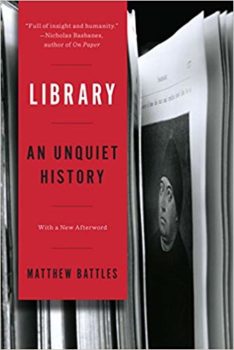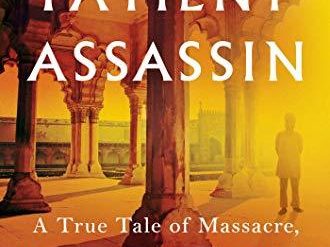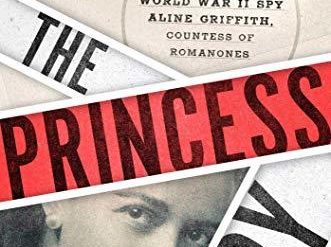
I have no idea what an “unquiet” history might be as promised in this book’s subtitle. But if you’ve picked up a copy of Library in hopes of reading a history of libraries through the ages, you’ll be disappointed. For example, although author Matthew Battles is American, he has not seen fit to mention the name Andrew Carnegie anywhere in his book. It’s hard to imagine the history of libraries in this country without acknowledging the more than 2,500 public libraries the steel magnate built with his ill-gotten gains as a predatory capitalist. The book is more accurately described as a pastiche of one librarian’s reflections on books, libraries, and librarians and the varied roles they’ve played since the first clay tablets were collected in a single place for later reference.
According to the author, the first library appeared more than 2,000 years after the Sumerians invented writing (around 3,200 BCE). “Ashurbanipal II, who ruled the Assyrian Empire in the seventh century B.C. . . . organized a great library at his capital, the already ancient city of Nineveh,” Battles writes, “which grew to include as many as 25,000 [clay] tablets.” But the emperor’s archive was nothing like what we know today as a library. That development came hundreds of years later. “The notion of a public library very much like our own is the invention of Caesar, who had planned one for the city [of Rome] just before his assassination.” Battles notes that Caesar’s supporters followed through on his plan, “building Rome’s first public library in the Forum around 39 B.C.”
Library: An Unquiet History by Matthew Battles (2011) 256 pages ★★★★☆
A history of libraries and librarians through the ages
In Library, Battles skips and jumps from one region and one era to the next with cheerful abandon.
China’s first emperor
As the legend goes, China’s first emperor, Shi Huangdi, attempted to monopolize all knowledge by destroying all the books published before his reign or dissenting from the party line—and dispatching their authors at the same time. Battles makes clear this didn’t really happen; the emperor’s propagandists set the legend in motion, apparently in fear of the emperor.
The library at Alexandria
The most famous library in history was, no doubt, that in Alexandria established by the successors to Alexander the Great, and it’s surrounded by legend as well. It turns out, though, that there wasn’t just one library at Alexandria, but two, and they were part of a much larger enterprise more closely resembling a modern university. And the library didn’t burn down when the Romans torched their ships in Alexandria’s harbor. (The only books lost were those in a waterfront warehouse.) In fact, the institution declined gradually over several centuries.
What the West owes to Islam
“Much of Western book culture owes its heritage to Islam,” Battles reveals. As historians know all too well, and so many American politicians seem determined not to learn, it wasn’t just book culture that the West gained from the spread of Islam. Much of what we know of mathematics, medicine, engineering, and Greek literature spread westward and north into Europe from Arab-occupied lands during the Middle Ages. While the West was shrouded in fear and superstition, the people of the Middle East and North Africa were leading the world during the Golden Age of Islam. A single library in Cordova contained between 400,000 and 600,000 volumes at a time when the number of books in typical Western libraries numbered in the hundreds.
As Battles skips through the ages, we encounter people whose names are familiar to any educated person . . . from Caesar, St. Augustine, and Cosimo de’ Medici to Jonathan Swift, Melvil Dewey, and Alfred Rosenberg. Library is a revealing book, and a treat for any reader who loves libraries. But look elsewhere for a comprehensive history of libraries.
For related reading
This title is featured on Good books about dictionaries, libraries, and language.
Recently I reviewed an outstanding book about libraries: The Library Book by Susan Orlean at An arson fire, the expanded role of libraries, and eccentric librarians. Although not directly related, the subject matter in The Swerve: How the World Became Modern by Stephen Greenblatt intersects with the literary criticism in Library. It’s reviewed at An historian explains how we came to think the way we do.
You might also be interested in 20 top nonfiction books about history.
And you can always find my most popular reviews, and the most recent ones, on the Home Page.


























